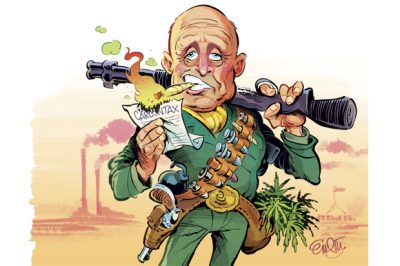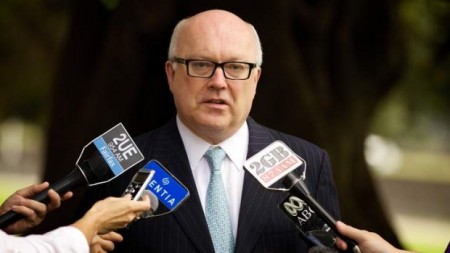When the IPA published their wish list of 75 plus 25 ways to “reform” Australia, they conceded that it was “a deliberately radical list. There’s no way Tony Abbott could implement all of them, or even a majority.”
They suggested that if he “was able to implement just a handful of these recommendations, Abbott would be a transformative figure in Australian political history. He would do more to shift the political spectrum than any prime minister since Whitlam.”
Perhaps they were right but not in the way they intended.
Tony is assiduously working his way through their list and he has certainly shaken the Australian public out of their political apathy.
Even before we get to the list, the article introducing it gave us a picture of what was to come.
“The vast Commonwealth bureaucracies and the polished and politically-savvy senior public servants have their own agendas, their own list of priorities, and the skill to ensure those priorities become their ministers’ priorities. Fresh-faced ministers who do not have a fixed idea of what they want to do with their new power are invariably captured by their departments.
So when, in the first week as minister, they are presented with a list of policy priorities by their department, it is easier to accept what the bureaucracy considers important, rather than what is right. The only way to avoid such departmental capture is to have a clear idea of what to do with government once you have it.
We should be more concerned that senior public servants shape policy more than elected politicians do.”
The IPA highlight “Gillard’s National Curriculum” as an example of ministers acquiescing when they should have been opposing. And why should they be opposing?
“The National Curriculum centralises education power in Canberra, and will push a distinctly left-wing view of the world onto all Australian students.”
So, presumably, when you put a lawyer in charge of education he should not listen to his department, he should not listen to the state ministers, he should not listen to the education experts. He should have already decided what he wants regardless of any advice from the public servants that have worked in that area for decades, and he should instruct them to implement his ideas.
But where does the lawyer get his ideas if not from all those paid to assist him?
Enter the IPA-aligned former chief-of-staff to Kevin Andrews, Kevin Donnelly, who has written many publications over the years arguing that the Australian school system is failing because schools have been taken over by radical educators who see their role as being to “liberate students by turning them into new-age warriors of the Cultural Left.” Pay him to reaffirm those oft published views in a “review” of the National Curriculum.
And while we are at it, get the former head of the Business Council of Australia (BCA), Tony Shepherd, to do an audit commission which came out like a wish list of BCA/IPA policy prescriptions, neatly cut and pasted, but not very well backed by facts.
The IPA go on to warn us of the real danger posed by the Australian National Preventive Health Agency – “a new Commonwealth bureaucracy dedicated to lobbying other arms of government to introduce Nanny State measures.”
Sure enough, it was one of the first agencies to be axed in Joe Hockey’s contribution to the wish list.
As the Melbourne Age’s economics editor, Peter Martin, noted in a piece of post-budget analysis: “Big food, big tobacco and big alcohol have been thrown the carcass of the Australian National Preventive Health Agency.”
The IPA also demanded an end to food and alcohol labelling, and to end “all government-funded Nanny State advertising” against unhealthy habits such as smoking, drinking and junk food consumption.
And so in February last year we saw the health department ordered to take down its new healthy food ratings website, and then $130 million was cut from a program to tackle Indigenous smoking despite it making significant inroads into reducing the high percentage of smokers in the Aboriginal community.
The IPA also quoted a previous Intergenerational Report and came to the following conclusion:
“Australia’s ageing population means the generous welfare safety net provided to current generations will be simply unsustainable in the future. Change is inevitable.”
No mention of the generous superannuation tax concessions which will soon overtake the aged pension, a stance also adopted by this government.
Whilst Brandis may not yet have satisfied the IPA’s desire to abolish the Human Rights Commission, the government has cut $1.65 million from its budget, refused to renew the position of its disability commissioner and appointed – absent the usual due process – one of the IPA’s own, Tim Wilson, as one of the remaining six commissioners. Attorney-General George Brandis flagged an intention to “further reform” the HRC which seems to be what this attack on Gillian Triggs is all about.
Brandis also flexed his muscles when, a month after being sworn in, he announced the forced resignation of ABC journalist Barrie Cassidy from his new job as chairman of the Old Parliament House Advisory Council.
Brandis said in his media release that Cassidy “accepted the importance of the Museum of Australia [sic] Democracy [in Old Parliament House] maintaining its apolitical and nonpartisan character”.
To have someone in the job currently engaged in politics, even if only as a political journalist, was “not consistent with that character”, Brandis said and then promptly replaced him with David Kemp who is a former Liberal minister and continues to practise politics through his work with the IPA.
The institute wants all media ownership laws eliminated along with the relevant regulator, the Australian Communications and Media Authority, and requirements put in place that radio and TV broadcasts be “balanced”.
Communications Minister Malcolm Turnbull is duly considering changes to Australia’s regime of cross-media ownership. The likely outcome: more concentration in Australia’s media, already the most concentrated and least diverse in the developed world. More influence for the IPA and Rupert Murdoch.
Not that the IPA need more exposure. In the year to June 2013, according to the IPA’s annual report, it clocked up 878 mentions in print and online. Its staff had 164 articles published in national media, mainly in the Murdoch press which, considering he is a long-time IPA director, is not surprising. They managed 540 radio appearances and mentions, and 210 appearances and mentions on TV.
The allegedly bias ABC, which the IPA would break up and sell off, gives the IPA a lot of air time too. One count, by Independent Australia, clocked 39 appearances by IPA staff in the year 2011-12 on The Drum alone. That’s almost as many Drum appearances as the combined total of all other think tanks, left, right and centre.
The repeal of section 18C of the RDA is number four on the IPA’s policy wish list, and before you knew it, Attorney-General George Brandis was up there championing the right to be a bigot.
On October 5, 2011, the IPA ran a full-page advertisement in The Australian supporting Andrew Bolt, paid for and signed by more than 1200 people including federal politicians Mathias Cormann, Jamie Briggs, Michaelia Cash, Mitch Fifield and Andrew Robb, to name a few, and literally dozens of other ex-pollies, staffers, and advisers.
Before he won the prime ministership, in April 2013, at a dinner celebrating the IPA’s 70th anniversary where Andrew Bolt was the MC, Abbott noted the IPA had given him “a great deal of advice” on the policy front, and promised them he would act on it.
“I want to assure you that the Coalition will indeed repeal the carbon tax, abolish the department of climate change, abolish the Clean Energy Fund. We will repeal Section 18C of the Racial Discrimination Act, at least in its current form. We will abolish new health and environmental bureaucracies. We will deliver $1 billion in red-tape savings every year. We will develop northern Australia. We will repeal the mining tax. We will create a one-stop shop for environmental approvals. We will privatise Medibank Private. We will trim the public service and we will stop throwing good money after bad on the NBN.”
In fact, one might argue that Abbott under-promised at that dinner and has over-delivered since. Other major items on the IPA’s published wish list included stopping subsidies for the car industry (done), eliminating Family Tax Benefits (part-done), the cessation of funding for the ABC’s Australia Network (done), abandonment of poker machine reforms (done), the introduction of fee competition for Australian universities (part-done), and negotiating free trade deals with Japan, South Korea, China and India (almost done).
While several of the IPA’s wish list are being held up in the Senate, they do have flesh in the game, and even more so should PUP Senators hold to their threat of abstaining from every vote until the leadership turmoil is resolved.
Cross benchers Bob Day and David Leyonhjelm are both “long-term IPA members”.
Bob Day was a driving force behind the IPA front organisation, the Owner Drivers’ Association, which purports to represent the interests of independent contractors in the transport industry. In reality, says Tony Sheldon, National Secretary of the Transport Workers Union, the ODA has consistently campaigned against laws improving working conditions and safety for drivers.
Another IPA front organisation is the Australian Environment Foundation. Two of its directors were IPA staff, including executive director Mike Nahan, now the treasurer in Western Australia’s Liberal government. For its first two years, the AEF shared the IPA’s postal address.
It was actually an anti-environment group. It opposed new marine parks and plans to increase environmental water flows in the Murray-Darling Basin, and supported Tasmanian woodchipping and genetically modified foods. It also lobbied the World Heritage Committee in support of the Abbott government’s plan to de-list parts of the Tasmanian forests.
Source watch even lists Peta Credlin under former staff of the IPA. I have not been able to verify that from any other source but she sure sings from their hymn book.
Not only are they determining policy and infiltrating all levels of government, they are also being rewarded with gifts. Despite cutting $100 million from the Arts budget, Minister for the Arts Brandis found $1 million to give the Australian School of Ballet to put towards the purchase of a $5 million mansion to house their 28 students in luxury. On the board of the school is Daniele Kemp, wife of former Liberal Minister Rod Kemp who is now the chairman of the IPA.
To paraphrase Pixie and Dixie…
They’re here, they’re there, they’re everywhere. So beware!
As Jinx would say…
“How ree-dick-ul-luss.”
Like what we do at The AIMN?
You’ll like it even more knowing that your donation will help us to keep up the good fight.
Chuck in a few bucks and see just how far it goes!












